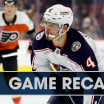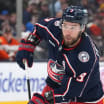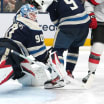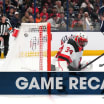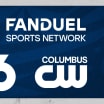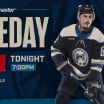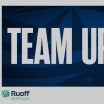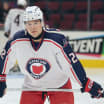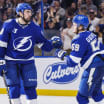This week, BlueJackets.com is taking a look at a few ways in which the game of hockey is changing right before our eyes. From a game that's getting faster by the second to one increasingly impacted by analytics off the ice, the NHL and the Blue Jackets are in the midst of an age of rapid transition. This week's stories will take a look at those trends across the league and how the Blue Jackets are staying at the forefront of all that is going on.
A strong argument could be made the 2001-02 Detroit Red Wings are one of the greatest teams to ever lace 'em up on NHL nice.
The Wings went 51-17-10-4 that season under head coach Scotty Bowman, then got by Vancouver and St. Louis in relatively easy fashion to get to the Western Conference final. It took all seven games to beat their nemesis from Colorado, but from there, the final was largely academic as Detroit rolled to a 4-1 series win over Carolina.
The Changing NHL: Tortorella embraces coaching youth movement
CBJ head coach leads one of the NHL's youngest teams
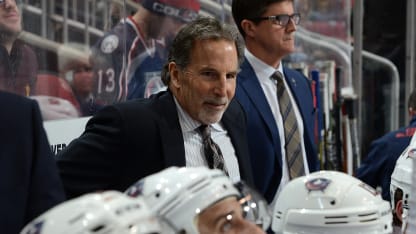
© Norm Hall/Getty Images
It was as star-studded a roster as one could imagine. The top eight point scorers all are already in the Hockey Hall of Fame, as is the starting goaltender. The names need no introduction -- Shanahan, Fedorov, Hull, Lidstrom, Robitaille, Yzerman, Larionov, Chelios, Hasek.
The other thing that stands out, looking at the roster through a present-day lens, is just how ... well ... old the players were. Each of those names above was at least 31 years old during the season, and Larionov and Chelios were both over 40.
You have to go to the No. 9 leading scorer, 23-year-old Pavel Datsyuk (another eventual Hall of Famer, by the way), to find someone under the age of 30.
THE CHANGING NHL: Speed kills | A new world for goalies | Player tracking is here
With that in mind, it's fair to wonder how that roster would compete in today's NHL. As we've detailed above, it's a younger, faster league than ever before, and younger might be an understatement.
According to Hockey-Reference.com, 48 of the NHL's 906 skaters to see the ice this past season -- just 5.3 percent -- were age 34 or older as of Feb. 1. Just 16 were 36 or older, the ages of Hull, Yzerman, Larionov and Chelios during the Wings' championship season 19 years ago.
There are still some excellent veteran players -- Mark Giordano just won the Norris Trophy at age 35, Joe Thorton and Justin Williams just topped 50 points at 39 and 37 years old, respectively; and Zdeno Chara continued to be a marvel at 41 -- but just nine members of 34-plus crowd topped 40 points.
Amid all of that, the Blue Jackets entered the 2018-19 season with the youngest team in the NHL, and this year's team could add such talented 20-year-old wingers as Alexandre Texier and Emil Bemstrom and potentially 19-year-old first-round pick Liam Foudy.
And yet the Blue Jackets also have one of the oldest coaches in the league in John Tortorella. But when it comes to the flourishing of young talent in the league, Tortorella says he embraces the energy and the teaching it requires to reach the younger generation.
"They want to learn," Tortorella said. "One of the most enjoyable parts of my job -- and we've had a pretty young team here for a number of years now -- I enjoy being around them and I think they want to learn.
"The biggest thing I try to stress with young players is, 'I want some information, too. Don't be afraid to talk to me about some things you may see that may help you.' All we want to do as coaches as help."
For a coach who has a reputation as being the oldest of old school, Tortorella's track record of working with young players since joining the Blue Jackets is strong.
A year ago, Tortorella had no problem throwing Texier into the crucible of postseason action as a 19-year-old. Pierre-Luc Dubois emerged as the team's No. 1 center before he could even have a legal drink in the United States. Oliver Bjorkstrand and Josh Anderson have grown from third- and fourth-round draft picks, respectively, into 20-plus goal scorers who are expected to be key parts of the team going forward. And the team's "safe is death" philosophy could be best encapsulated by the fact Tortorella has given Zach Werenski and Seth Jones the ability to push the game's pace from the blue line.
The head coach certainly hasn't taken it easy on those young players -- his demanding rhetoric on many of them as they've gone through the peaks and valleys of learning how to be consistent players in the NHL game has been documented -- but he also seems to have found a balance on how to reach those them.
"The biggest thing for me, especially with today's athlete, I think it needs to be a two-way street," Tortorella said. "It's not coaching players by coaching at them, I think it's coaching with them. I think that's very important, whether it be a young player or a veteran player, because it's a different type of athlete.
"Quite honestly, it's not really about the X's and O's, it's about getting at the end of the rope and pulling the rope at the same time with everybody else."
The phrase "today's athlete" is one Tortorella has used a number of times, and it does signal a shift in how coaching strategies have developed over the years. The stereotype of the old-school coach who barks orders from on high doesn't quite apply like it used to, and players have a curiosity as to how certain methods will help them get to where they want to go.
It's an era where millennials are blamed for a variety of society's ills -- or at least the prevalence of avocado toast and the death of chain restaurants -- but at the highest level of hockey, the youth movement doesn't seem to come with such worries. The drive and energy of young players shows a generation that simply wants to get better at its craft.
"I think people ultimately want to get better, and by listening to someone like Torts or an older player, they still want that," said Mike Eaves, who was hired this offseason to take over as coach at AHL Cleveland. "That hasn't changed. I think this (millennial) label is there, and how far that goes depends on what you allow as a coach within your culture. I read a great article on that -- that only exists if you let it, the things they pin on millennials.
"I think depending on what your style of coaching is, the old days of saying, 'Do this, don't ask why,' those are gone. But if you grew up with a style of explaining why you do these things, it's not a big change at all."


